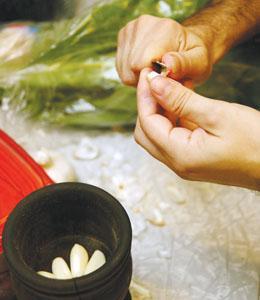The smell of seasoned black turtle beans, salted pork and rice filled a hectic, southern Louisiana kitchen with the aroma of Ronaldo Cadeu’s Brazilian culture.Cadeu, composition graduate student, and several international students stay tied to their native roots by incorporating their homeland’s cuisine into their weekly routines.”This is a part of my country that I’m bringing here,” Cadeu said of Feijoada, once the staple of Brazilian slaves who adapted it over time to be the most famous South American dish. Conor Picken, graduate teaching assistant who will instruct a food and culture English class in the spring, attributed the international students’ cooking customs to a desire to revisit their traditional customs.”For international students, authentic food is a means to grasp — in a concrete and tangible way — their heritage,” Picken said. “Holding on to their nation’s cuisine is important because it provides an outlet — a means to retain an authentic element of their culture that might otherwise be swept under the rug in this foreign place.”Food can also serve as a memory of international students’ lives in their native countries, said Sudipta Sarangi, economics professor. “It has to do with the fact that some foods are called ‘comfort foods,'” Sarangi said. “They serve a variety of purposes, like providing [you] with pleasant memories and reminding [you] of some of the things you are most used to. It’s not that students are trying to hold on. Their native cuisine is a part of their everyday life there, including LSU.”Akinyanju Adeyanju, chemical engineering senior, uses his cuisine as a way to identify with his Yoruba tribe of southern Nigeria.Though the ingredients used in Nigerian cuisine are similar throughout the different cultures, each tribe has a specific way of preparing the food, which identify tribal roots.Adeyanju said experimenting and mixing food from different tribes makes Nigerian cuisine spicy, hearty flavors unique. Dried fish and crawfish, red peppers and yams are some regularly used ingredients. “Behind every cuisine, there is a story — the story about the culture of its origin,” said Sukanya Gupta, graduate teaching assistant from India. “It is not only important for international students to hold on to their native country’s cuisine in their everyday life at LSU, as food is such an integral part of peoples’ identities, but it is also natural and inevitable for some of us.”Ping Xu, political science graduate student, said the flavor of Chinese food and the hope to spread her culture to University students keeps her preparing her native cuisine at least twice a week.”It is more flavorful, and sometimes you just feel like eating something from home,” Xu said. “Sometimes my American friends, classmates and host family are curious what real Chinese food is like, so I cook for them or with them, which is a lot of fun.” The similarity between the rich flavors of Cajun and Saudi Arabian cuisines motivates Ahmed AlTammar, petroleum engineering junior, to cook his favorite dish, Kabsa, which is similar to jambalaya, at least once a week.”Louisiana food is the closest food in the country to my culture,” AlTammar said.Finding time to cook is a difficult problem facing international students. Cadeu said his Brazilian friends met each week during the summer to cook their favorite meals, but his workload caused him to eat more American food, which he “doesn’t particularly like.” Adeyanju said he must get most of his ingredients from Nigeria, and the high cost prevents him from often purchasing the necessary products. But Adeyanju and Cadeu noted the ability to improvise with ingredients as an important skill in cooking ethnic cuisine.”Comfort foods like other necessities have inelastic demand — the quantity purchased of these things does not change when price changes,” Sarangi said. “So in these difficult times when prices rise, people still need their comfort food and hence they are willing to spend money. It’s about what makes you feel happy and not necessarily money all the time.”—-Contact Margy Looney at mlooney@lsureveille.com
Students bring native cuisine to BR
December 4, 2008




